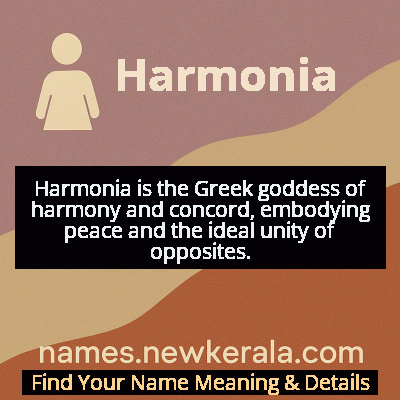Harmonia Name Meaning & Details
Origin, Popularity, Numerology Analysis & Name Meaning of Harmonia
Discover the origin, meaning, and cultural significance of the name HARMONIA. Delve into its historical roots and explore the lasting impact it has had on communities and traditions.
Name
Harmonia
Gender
Female
Origin
Greek
Lucky Number
7
Meaning of the Name - Harmonia
Harmonia is the Greek goddess of harmony and concord, embodying peace and the ideal unity of opposites.
Harmonia - Complete Numerology Analysis
Your Numerology Number
Based on Pythagorean Numerology System
Ruling Planet
Neptune (Ketu)
Positive Nature
Intuitive, analytical, spiritual, and inquisitive.
Negative Traits
Secretive, reserved, aloof, and can be overly critical.
Lucky Colours
Green, yellow.
Lucky Days
Monday.
Lucky Stones
Cat’s eye, moonstone.
Harmony Numbers
1, 5, 6.
Best Suited Professions
Scientists, researchers, spiritual leaders, detectives.
What People Like About You
Depth of knowledge, analytical skills, spirituality.
Famous People Named Harmonia
Harmonia Rosales
Contemporary Artist
Revolutionizing classical art representation through Afrocentric reinterpretations
Harmonia Sacra
Musical Collection
Preserving early American sacred music traditions through shape-note singing
Harmonia Macrocosmica
Astronomical Publication
Creating one of the most beautiful and comprehensive celestial atlases of the Baroque era
Name Variations & International Equivalents
Click on blue names to explore their detailed meanings. Gray names with will be available soon.
Cultural & Historical Significance
Beyond mythology, Harmonia became a central concept in Greek philosophy. Pythagoreans saw harmonia as the mathematical principle governing the cosmos, expressed through musical intervals and planetary motions. Plato incorporated this concept into his theory of the soul's harmony, while Aristotle discussed it in terms of political and social balance. During the Renaissance, Harmonia reemerged as a powerful symbol in art and music, representing the ideal balance between human intellect and divine order. Today, the concept continues to influence fields from psychology (Jung's concept of individuation) to ecology (balance in natural systems), demonstrating the enduring power of this ancient ideal.
Extended Personality Analysis
People named Harmonia typically exhibit a remarkable capacity for creating balance and resolving conflicts, often serving as peacemakers in their social circles. They possess an intuitive understanding of group dynamics and can identify underlying tensions before they surface. This makes them excellent mediators, counselors, and team leaders. Their artistic sensibilities often manifest in creative pursuits, whether in music, visual arts, or writing, where they excel at creating works that feel cohesive and well-proportioned. They tend to be deeply empathetic, able to understand multiple perspectives simultaneously without losing their own center.
However, the pursuit of harmony can sometimes lead to challenges. Harmonia-named individuals might avoid necessary conflicts or suppress their own needs to maintain peace, potentially leading to internal stress. They may struggle in highly competitive or aggressive environments where their diplomatic approach is undervalued. Their strength lies in their ability to transform discord into cooperation, but they must learn that some conflicts are necessary for growth. Typically, they mature into individuals who understand that true harmony isn't about avoiding differences but about integrating them creatively. Their life journey often involves learning to balance their natural peacemaking tendencies with healthy self-assertion.
Modern Usage & Popularity
In contemporary naming practices, Harmonia occupies a unique niche as a name that is both classical and meaningful without being overly common. While its usage remains relatively rare compared to more popular mythological names like Athena or Diana, it has maintained a consistent presence, particularly among parents with interests in classical education, music, or philosophy. The name saw a slight resurgence during the New Age movement of the 1990s when concepts of balance and harmony gained cultural prominence. Currently, it's experiencing gentle growth as parents seek names with positive meanings and mythological depth that aren't overly trendy. The English variant 'Harmony' has seen more significant usage, ranking around #250 in the United States, while the original Greek form appeals to those seeking authenticity and classical resonance. The name is particularly popular in artistic communities and among families with Greek heritage, serving as a sophisticated alternative to more common virtue names like Grace or Faith.
Symbolic & Spiritual Meanings
Symbolically, Harmonia represents the profound concept that unity emerges from diversity rather than uniformity. In musical terms, it symbolizes how different notes create richer harmonies when combined than when played alone. This extends to social symbolism, where Harmonia represents the ideal of diverse communities working in concert. In psychological symbolism, she represents the integrated self - where conscious and unconscious, masculine and feminine aspects achieve balance. Alchemically, Harmonia symbolizes the 'conjunctio oppositorum' (union of opposites) that creates the philosopher's stone. Ecologically, the name embodies the principle of biodiversity where different species create stable ecosystems. In relationship dynamics, it represents the concept that the most enduring partnerships balance similarities and differences. The symbolic power of Harmonia lies in her demonstration that true harmony isn't the absence of conflict but the creative resolution of differences into a higher synthesis. This makes the name particularly resonant in our increasingly interconnected yet diverse global society.

